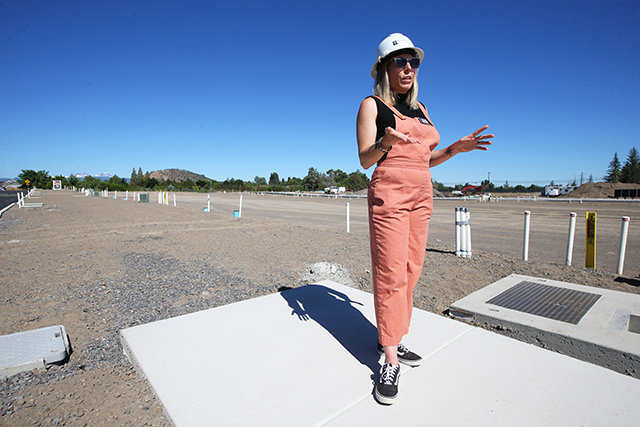Americans make inroads in England’s game, and not all are happy
Published 10:48 pm Monday, September 18, 2017
LONDON — A few weeks before last November’s presidential election in the United States, Matthew Barzun, the country’s ambassador to Britain at the time, hosted a party.
When all of his guests had arrived, Barzun clinked a glass and asked for silence. A confidant of the man who had appointed him, President Barack Obama, he said he knew that — whoever won the election — this would be one of his last chances to host such an evening.
Trending
So, he said, he wanted to use it to celebrate something that he, and particularly his children, cherished: the special relationship between the United States and English soccer. This was the first time, he joked, that his children had been disappointed that they were not allowed to stay up late to join the party.
No wonder. Barzun’s regular soirees at Winfield House — the opulent mansion in Regent’s Park that serves as the U.S. ambassador’s residence — had won no little fame; he knew how to put on a show. This was no exception. The main hall had been covered in artificial turf. The Premier League trophy was on display. In an ornate side room, an Xbox had been set up, offering guests the chance to try their hand at the latest edition of the popular FIFA video game.
The crowd was largely made up of players, coaches, owners and team executives. John Henry, Liverpool’s owner — fresh from facing his wife, Linda Pizzuti Henry, on the Xbox — chatted happily with Stan Kroenke, his counterpart at Arsenal.
Arsène Wenger; former goalkeeper Brad Friedel; and Geoff Cameron, Stoke City’s U.S. defender, joined Arlo White, host of NBC’s Premier League coverage, for a question-and-answer session.
On stage, Wenger expressed his amazement at the transformation. He could never have foreseen a time, he said, when Americans owned roughly a dozen of England’s clubs. He was, he said, delighted by it. Polite applause rippled among the guests.
Outside that room, though, the picture is more complicated. Barzun might have wanted to celebrate the special relationship that had brought so much U.S. influence into the Premier League, but not everybody in England does.
Trending
American invasion
The detail that Josh Harris and David Blitzer, part of the ownership group that controls the Philadelphia 76ers of the NBA and the New Jersey Devils of the NHL, went into as they considered their bid to take over Crystal Palace was forensic.
Over the course of more than a year as they weighed investing, Harris and Blitzer pored over the numbers so often that, by the end, they had dozens of financial projections for the club, accounting for a host of outcomes. In none of them, it is fair to assume, did the prospect of firing a coach after 77 days feature.
When Harris and Blitzer finally completed the deal to acquire Palace in December 2015, the South London club became the eighth English team under U.S. control. The Glazer family had been the first on the scene, buying Manchester United in 2003. In the years to come, Liverpool (twice), Arsenal, Aston Villa, Sunderland, Fulham, Millwall and Derby County would follow.
After Harris and Blitzer, Swansea City and Portsmouth, too, moved into U.S. hands; Bournemouth is partly owned by Matthew Hulsizer, a Chicago financier. Barnsley, targeted by a consortium including Oakland A’s executive Billy Beane, may be next.
Few, if any, would count as unqualified successes. The Glazers faced protests almost from the start; even now, the Manchester United Supporters’ Trust believes no owner has “ever taken so much money from a single club.” Kroenke is blamed for Arsenal’s inertia. Henry is hardly universally popular in Liverpool.
Fulham, Aston Villa and Sunderland have all been relegated. Swansea City only narrowly avoided the same fate last season, and relations between the club’s fans and its U.S. owners, Steve Kaplan and Jason Levien, remain strained. And at Palace recently, the club appointed Roy Hodgson to replace Frank de Boer, fired after only four games in charge. He is the fourth coach in Harris and Blitzer’s brief tenure.
“It is unfair to say they have all been complete failures,” Chris Anderson, who has consulted on a number of completed and putative takeovers, said of U.S. owners in Britain. “But many do struggle with the dynamics of the game, and the industry. They find it hard to understand the nature of the beast.”
According to Steven Gans, a Boston lawyer who advises teams and owners, including several in Britain, there is a direct connection between the way U.S. parents approach their children’s soccer games and the way U.S. owners approach the clubs they pay hundreds of millions of dollars to acquire, and he argues that it is this link that is the root of the problems Americans have endured since they started arriving in England.
“Parents of kids who play soccer tend not to have a frame of reference for it in the same way as they would for baseball, for example,” Gans said in a telephone interview. “They are insecure, only dipping their toes into it. They presuppose they do not know enough. So they outsource it to whoever seems to know more, and that is not always the right person.
“The same pattern applies to owners when they buy an asset. They are at the mercy of their own insecurities. They have less confidence in their own judgment, so they completely outsource the running of it.
“John Henry knows baseball in a way he does not know soccer, so he suspends his normal instincts. He tends not to interject his own thoughts and evaluations. In soccer, U.S. owners outsource the running to people who seem to have the right experience.”
The problem for many U.S. owners — especially at first — is in establishing who, exactly, that might be. “When you land at an airport in a foreign city, sometimes you get charged twice the normal rate by a taxi driver, and you pay it, because you don’t know any better,” said Hendrik Almstadt, a German executive who worked both at Randy Lerner’s Villa and Kroenke’s Arsenal. “It happens to us all.”
British influence
At first, in Almstadt’s experience, U.S. owners tend to believe a “cool, rational, analytical approach” will make them the exception in the chaotic, impulsive atmosphere of European soccer.
Few arrive aiming to be a benefactor in the style of Roman Abramovich, lavishing bottomless wealth on their teams. They believe that their knowledge will yield success.
The problem, Almstadt argued, is that English soccer’s establishment — the old hands, longstanding coaches, influential former players and a hostile news media — is inherently resistant to new ideas. Americans arrive wanting to mold their new environment, but on unknown territory in an unfamiliar sport, too often they allow the opposite to happen. It is an echo of Gans’ theory: They are at the mercy of their insecurities.
At Sunderland and at Villa and increasingly at Palace — where Harris and Blitzer have left day-to-day decisions to Steve Parish, an Englishman and minority owner — the managerial churn has been endless. At other clubs, executives, too, have come and gone: owners not trusting their own judgment, vacillating between concepts and advisers, unable to hear themselves think amid the deafening cultural dissonance.
“After a while, you become locked in a death spiral,” Almstadt said. Poor decisions induce panic, and vice versa.
But he and Anderson say they believe things are improving. “The commercial model of the Glazers is now being copied by a lot of teams,” Almstadt said. “More and more teams have a front-office model now, too, where coaches are a part of — a very important part of — a broader structure.
“There is a definite American influence on English football starting to show.”
Anderson has been encouraged, too. He praised Henry for his “trial and error” approach and noted that Liverpool’s gradual improvement suggested that lessons are being learned and that the right people are being retained. He has also found that more owners are doing more comprehensive due diligence on teams before buying.
“They are getting people in to look at their squads, their academies, their staff, to see exactly what they are getting,” he said. Owners have always paid close attention to the finances. Now, they are beginning to dig under the surface of the soccer, too.
That was why there was plenty to celebrate that night at Winfield House. As Wenger said, the special relationship between the United States and the Premier League would have been unthinkable only a few years ago. It is still young, though, still developing. It is perhaps a little too early for the Champagne to flow. There is a lot, still, for both sides to learn.
There is a direct connection between the way U.S. parents approach their children’s soccer games and the way U.S. owners approach the clubs they pay hundreds of millions of dollars to acquire, and he argues that it is this link that is the root of the problems Americans have endured since they started arriving in England.








